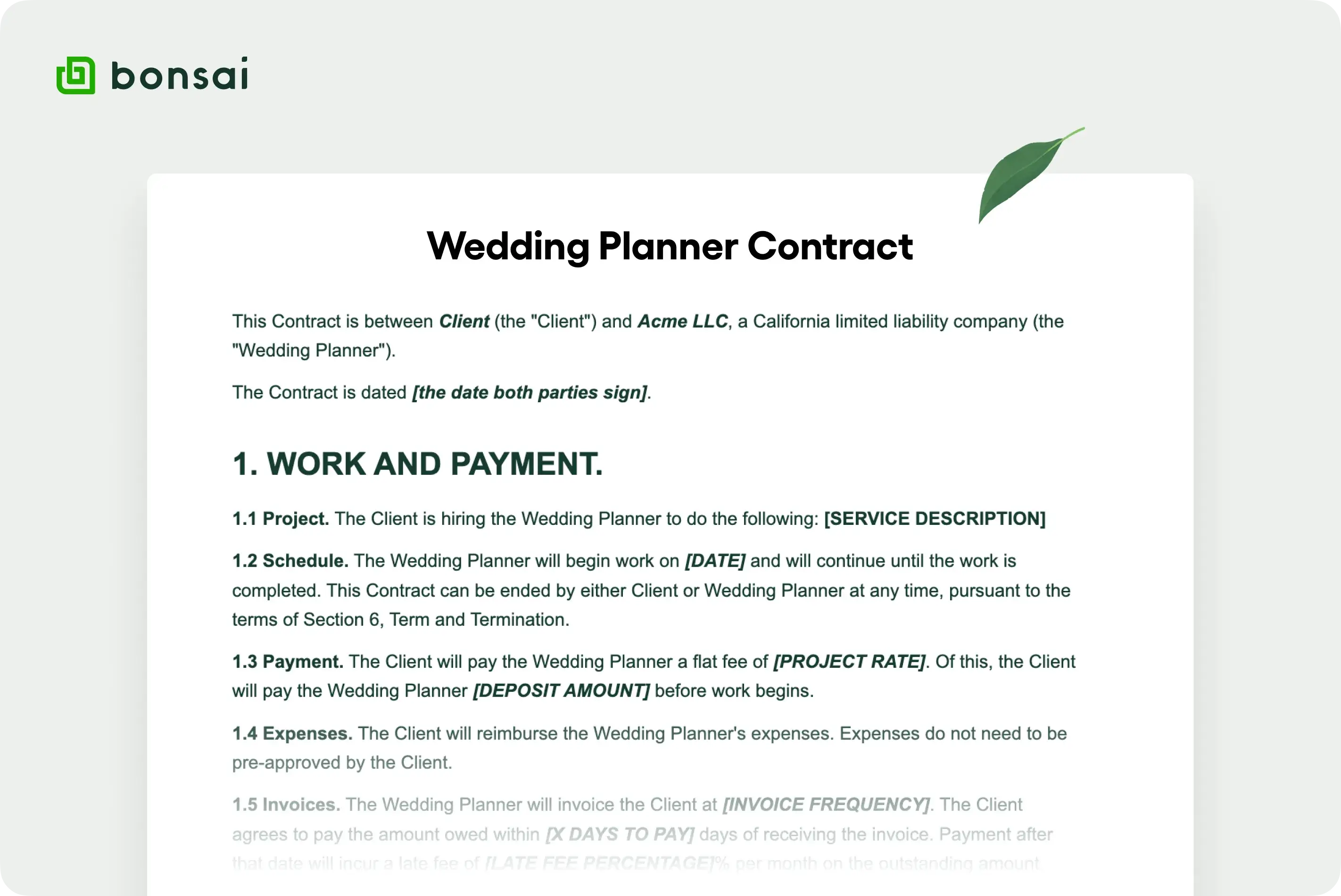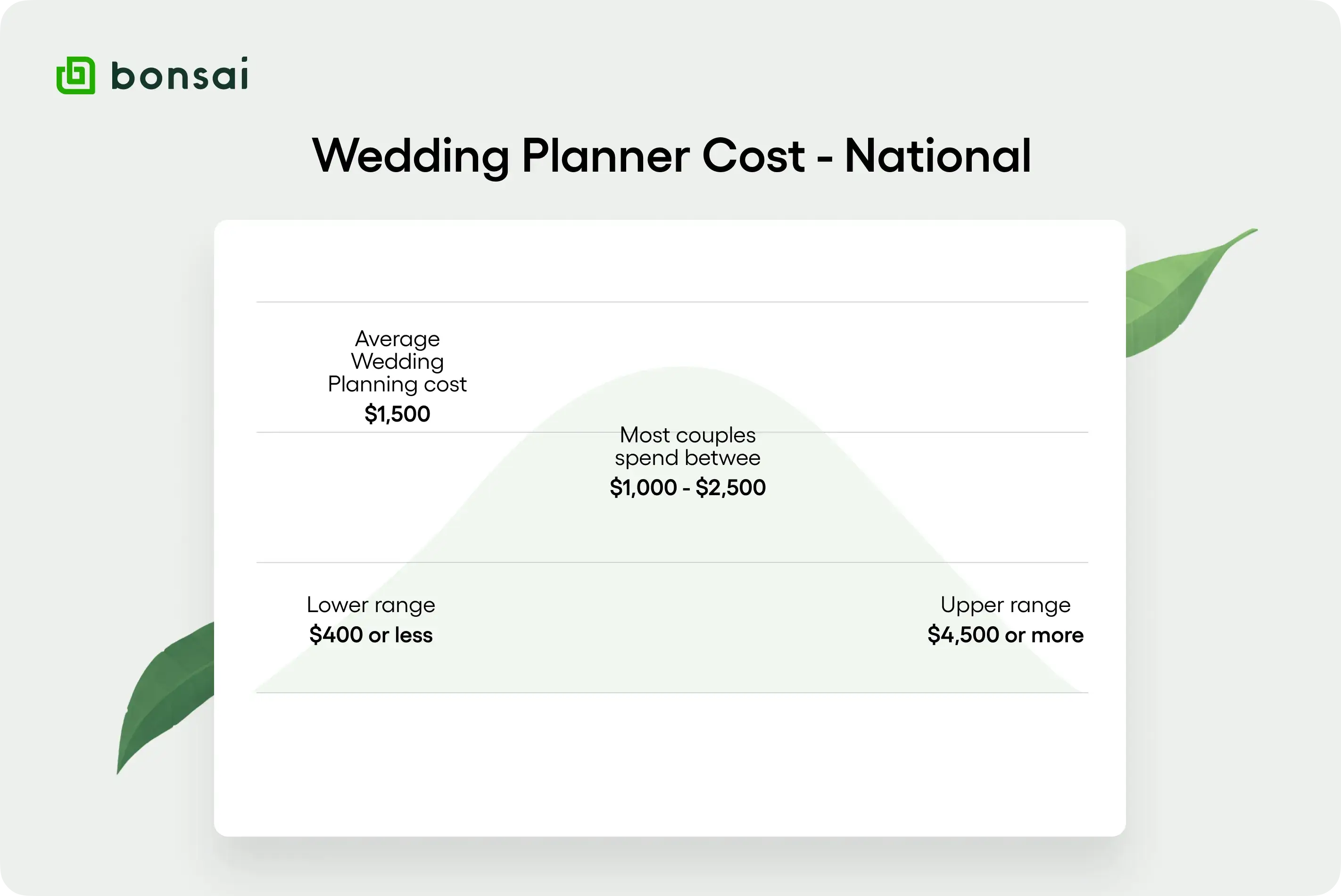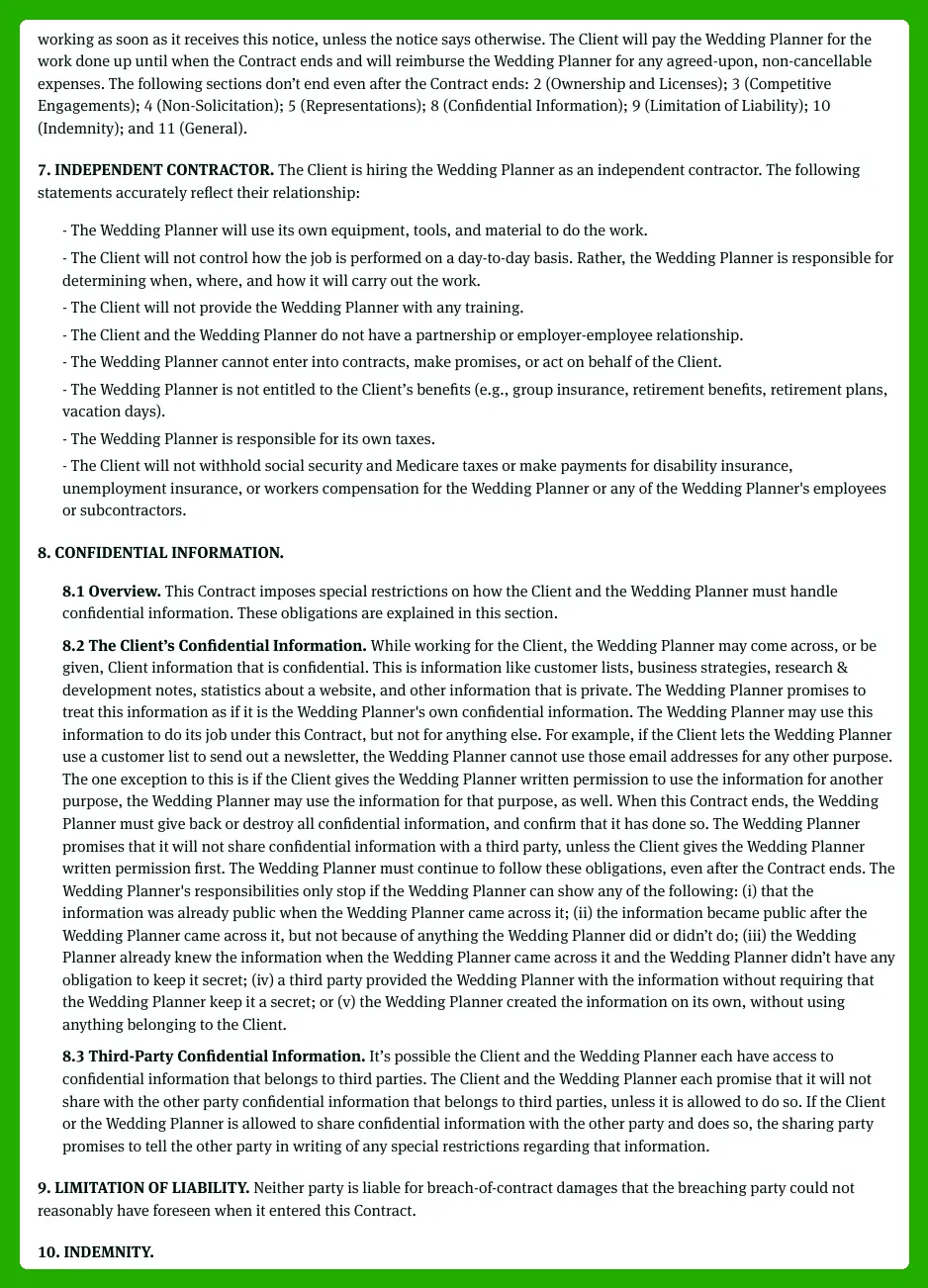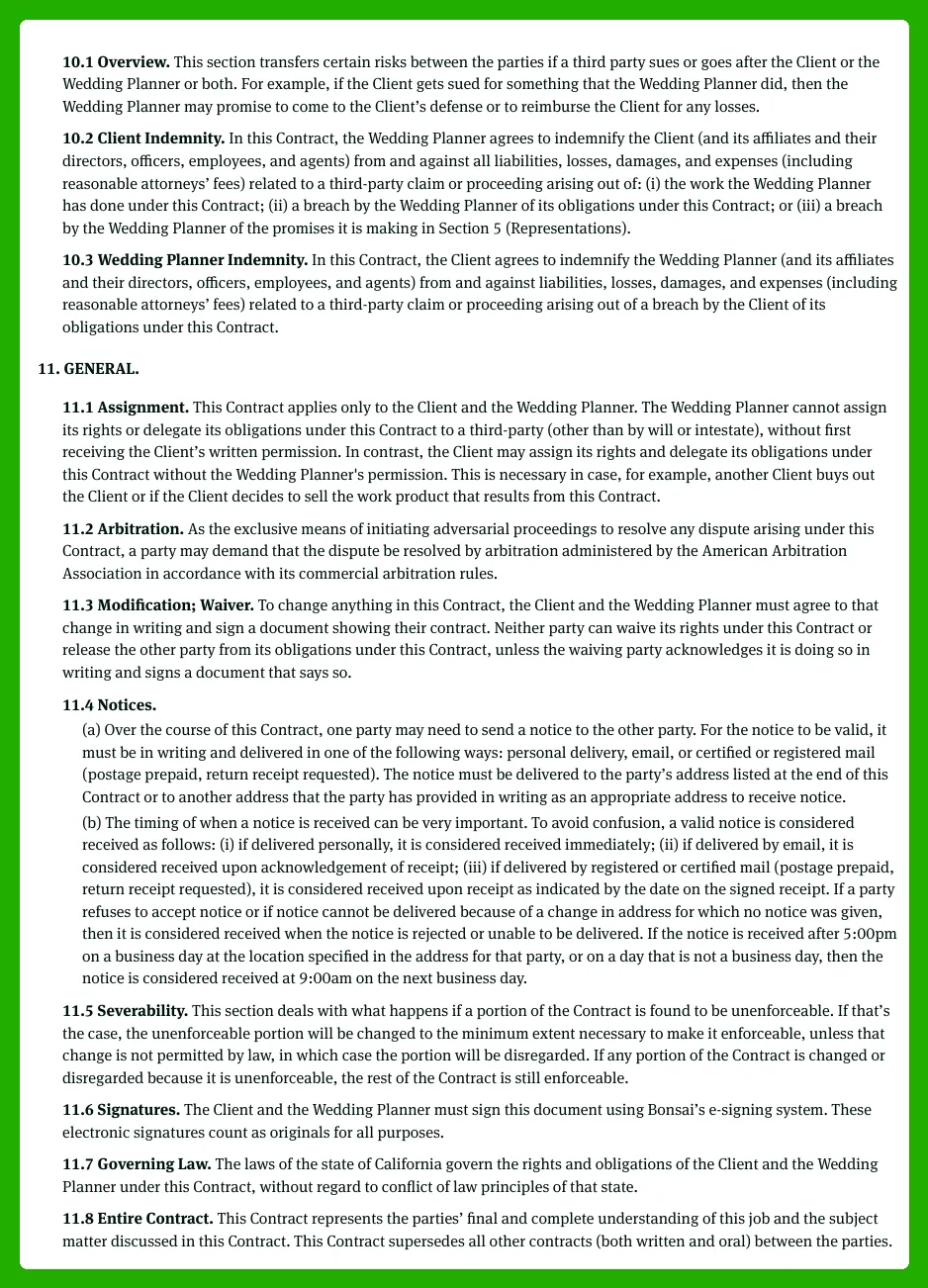
Planning a wedding is a big responsibility. A wedding planner has to make sure that everything goes smoothly.
And while a wedding planner's responsibilities, roles, and expectations vary from client to client, outlining these roles and responsibilities well in advance is important so you don't have to deal with any last-minute negative situations.
And that’s where a wedding planner contract can help. This contract will outline all the expectations and document everything so there aren’t any disagreements as you move forward with your event.
Even though the expectations will be different for every wedding planner, this article will give you a good idea of what to include in the contract. We’ll also talk about how you can modify our free wedding planner templates to suit your needs.
Let’s begin!
What Is a Wedding Planner Contract?

Wedding planners have the incredibly stressful responsibility of creating and organizing a wedding event. They bring a wedding to life and ensure everything goes according to plan. And to do that, they use wedding planner contracts. A good wedding planner contract is tailored for personalized services. Typically, a contract outlines responsibilities of both parties involved.
The contract outlines responsibilities of both parties, ensuring a smooth and well-coordinated celebration. It defines the scope of services and addresses potential disputes fairly and objectively.
A wedding planner contract is an essential, formal, and legally binding agreement between you and your client. The wedding festivities are based on a set of conditions your client or wedding planner provides.
Such an agreement binds both parties in a commitment to crafting the perfect wedding experience. The length of your wedding does not affect the contract. The terms and conditions will remain the same whether it’s a quaint, one-day or a week-long wedding.
Benefits of Using a Contract Template for a Wedding Planner
A professional wedding contract outlines the exact role of the wedding planner, the terms and conditions of both parties, the payment process, and more. Its primary role is to offer legal assurance around all the clauses mentioned in the contract. Secondly, it ensures clear terms for all aspects of the wedding planning process, leaving no room for confusion.
When you use a pre-made template, you can draft all the requirements in one place without leaving out any essential clauses. You can also easily edit these templates without disrupting other clauses in the agreement.
The agreement is valid for a specific period according to agreed-upon terms. It can be amended based on changing needs and circumstances. The contract also sets expectations for both parties, including terms of confidentiality in protecting your privacy.
And that’s not all. Here are some other reasons why you should use a contract template for a wedding planner:
1. Protection for Both Parties
Like any other job, planning a wedding is a job. So, it is necessary to approach the role with a professional mindset. A contract will outline the responsibilities of both parties and protect both parties in case of any problem.
2. Sets Clear Expectations
The responsibilities of a wedding planner may include:
- Booking the venue and the photographer
- Arranging guest transportation
- Planning the seating arrangement
- Planning their work hours
- Organizing food and lodging.
Effective guest management and RSVP tracking are essential for a stress-free wedding experience, ensuring that seating arrangements, catering, and other logistical details are perfectly tailored to accommodate the expected number of attendees.
So, mentioning all of these in the contract can help the other party better understand their role and your expectations. The more detail you include in the contract, the better.
3. Settles Payment Concerns
Wedding planners need to know how many hours they’ll be working for. So, the contract should mention their exact work hours. Plus, it should outline whether or not the planner will be present at the wedding.
So, in a nutshell, a typical contract should include the following:
- Payment dates
- Working hours
- Cancellation fees
- Refund amount (if any).
You can also provide an invoice template with your contract if you’re expecting your wedding planner to work overtime or as a contractor. The document typically includes payment details for transparent financial arrangements.

Using a Wedding Planner Contract Template

Let’s see how to use a wedding planner contract template.
1. Confirm Vendor Agreements
All the vendors should be documented in the contract. This means including information like:
- The confirmed dates for the event
- The exact locations for the events and necessary wedding items
- The time of deliveries by vendors.
Also, the contract should confirm that the payments for all items will be made on time and that any relevant advance or installment payments will be cleared.
2. Detailed Wedding Design and Theme Planning
Decor and theme coordination are pivotal aspects of a well-planned wedding, ensuring that every element harmoniously aligns with the chosen theme, creating a visually stunning and cohesive atmosphere.
As part of the wedding planner contract, the wedding planner’s job is to coordinate everything with the couple and all those involved. This means the color palettes, ideas, floral arrangements, musicians, and catering should all be decided by them.
Planners can begin by interviewing the couple and understanding what they want in their dream wedding. Once they’ve done their research, they should note everything down in their contract template.
3. Address Changes and Last-Minute Requests
The contract should also establish a process to handle last-minute changes and accommodate them without any hiccups.
Moreover, it should specify the guidelines for finalizing these changes and clearly communicate if any additional fees will be charged for last-minute requests.
4. Handling Cancellations or Postponements
The contract should detail the process for postponing the wedding or canceling it altogether and clearly outline the fees or penalties charged in such cases. The rescheduled dates and availability should also be communicated in the contract.
Plus, the contract will outline the reallocation of payment already made in such a scenario. To ensure you have all the clauses in your wedding planner contract, check out our free planner template.
What to Include in a Wedding Planner Contract
Getting an acceptance in writing ensures you have a proper paper trail. A standard wedding planning contract covers cancellation policies for unforeseen circumstances.
Here are some common points that you should include in a wedding planner contract:
1. Contract's Purpose
Make sure the contract’s purpose is to formalize the new relationship and outline various legal obligations both parties owe to each other. It should outline the nature of these obligations and the actions that either side can take if the commitments are not met.
2. Detailed Client Information
The contract should have a detailed section listing the client’s information. This includes the following:
- The names of the couple
- Email addresses
- Home addresses
- Phone numbers
- Any other required information.
3. Comprehensive Scope of Services
A wedding planner contract should outline the job role of the wedding planner, what they’re expected to do, their tasks, how they will organize the wedding, and where they’ll source their materials from.
Each service should be broken down into smaller categories with their respective costs documented in the contract.
4. Payment Structure and Schedule
The next clause to include is the payment structure. The structure should include:
- The necessary advance payments and mode of payment transfer
- The non-refundable payments for different services
- A Breakdown of all costs and the estimated budget.
5. Specific Event Date, Time, and Location
In the wedding contract, you should also talk about the following:
- Venue, its address, and the number of guests it can cater to.
- Time of the ceremony, reception, and any rehearsal dinner.
- Location where the ceremony and reception will be held (in case they are different).
Rehearsal arrangements are crucial in preparing the wedding party for the big day, allowing everyone to familiarize themselves with the ceremony proceedings and ensuring a smooth and confident walk down the aisle.
Double-check all these details because even a slight change of address can wreak havoc on your plans.
6. Vendor Coordination and Management
A wedding planner contract should include details about how the planner will coordinate with the vendor management. However, this is a variable clause as the client can choose to handle vendors and coordinate with them independently, or they can ask the planner to do it.
Either way, it is important to confirm whose responsibility it will be to ensure no last-minute confusion and potential arguments.
7. Responsibilities and Duties of the Wedding Planner
Lastly, all the responsibilities and duties of the wedding planner should be clearly mentioned in the contract.
The client should be clear on what they expect from the wedding planner, and the planner should have the liberty to agree or disagree with those expectations and requests before signing the contract.
Types of Wedding Planner Contracts

Here are some types of wedding planner contracts you can start with based on the offered services:
1. Full-Service Wedding Planning Contract
A full-service wedding planning contract means the wedding plan will cater to everything. From coordinating with the vendors to managing lodging for guests. This contract should include:
- Structured payments and the respective deadlines
- The details of all services offered as part of the contract
- The wedding duration
- Any other tasks for the wedding planner.
2. Day-of Coordination Contract
This contract includes clauses for the wedding day itself. It should finalize all the details, the timeline, and what will be managed by the planner and have a proper breakdown of all the services and respective dues for each service.
3. Consultation-Only Contract
A consultation-only contract offers consulting services without any direct involvement. This means giving the couple a few ideas, designing mood boards for them, and offering guidance on vendor selection, floral arrangements, and planning tips for the big day.
4, Destination Wedding Planning Contract
A destination wedding planner contract template simplifies wedding planning projects and guarantees client collaborations. It talks about the following:
- Business Hours – This is the clause where you set expectations for your availability to help clients understand when to contact you.
- Communication Channels – This is where you'll state how the contact will be maintained, i.e., via email, phone, or both.
- Meeting Schedules – This is where you state how much time you need to schedule a meeting with the clients to avoid last-minute requests.
- Schedule – This clause will outline when the wedding planning will start and when it will end.
- Payments – This clause will set the expectations for the payments and what will happen if the payment is not made timely.
Tips for a Professional Wedding Planning Contract

Here are some tips to help you create your very own professional wedding planning contract:
1. Start with a Clear Title and Introduction
Make sure your wedding planner contract has a clear title and introduction. These should reflect what you’ll be talking about in the contract.
2. Use Clear, Concise, and Simple Language
You don’t want to use any jargon in the contract. Be as straightforward as possible so nothing is confusing for the other party.
Also, avoid using metaphors or language that cannot be understood easily. Remember, you’re not signing a corporate contract; it’s a wedding contract, so it should be as simple as possible.
Moreover, make sure your contract includes a comprehensive guide that explains every section in plain English. This will help everyone involved know what the contract is talking about.
3. Specify Payment Terms and Schedules
Define clear timeframes for expecting the payment. You should also have a meeting about these clauses and clarify anything that could lead to legal problems in the future, such as the matter of who owns the intellectual property of the wedding ideas.
4. Detail the Scope of Work
A contract should mention the scope of work in detail, such as the deliverables of the wedding tasks, the timeline, and relevant updates on how everything is structured. This helps all parties understand their responsibilities.
5. Address Cancellations and Refunds
Clauses for cancellations and refunds should be included in a contract. They look like this:
- A 25% refund is available in case of canceling service one month before the event.
- A 50% refund is available in case of cancellation two months before the event.
- A 75% refund is available in case of cancellation three months before the event.
You can structure this section according to your rates and policies. Also, a good practice is to include as many clauses around cancellation and refunds as possible so both parties have an idea of what will happen if they need to cancel services.
6. Highlight Liability and Insurance Clauses
Liability insurance clauses will provide protection against claims resulting from damage or injuries to other people or property. The insurance will cover any legal costs and payouts the insured party is responsible for when you’re working.
Key Takeaways
Wedding planning can be a nightmare without a contract. Fortunately, Bonsai’s free wedding planner contract template can help you understand your priorities and execute them without any confusion.
The template is very comprehensive. It talks about everything you need to include in a professional wedding planner contract and even helps you understand what edits you’ll need to make to fit it to your situation.
FAQs
Can I Customize the Wedding Planner Contract Template to Fit My Specific Needs?
Yes, you can easily edit a wedding planner contract template without disrupting any of the other sections.
How do I Handle Changes or Modifications Once the Contract is Signed?
This clause should be included in the contract and say that any changes or modifications, if acceptable, should be catered to once the contract is signed.
Is a Wedding Planner Contract Legally Binding?
Yes, Bonsai’s free wedding planner is reviewed by lawyers and is legally binding.












.webp)

.webp)




